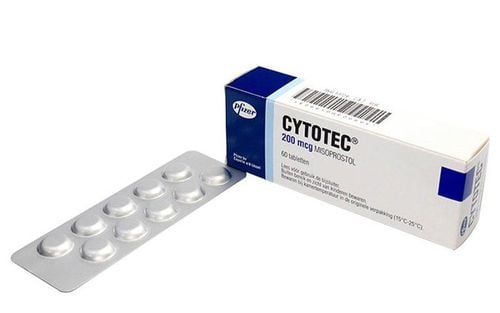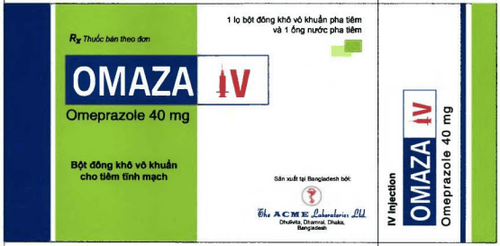This is an automatically translated article.
Pantoprazole is a proton pump inhibitor, which binds to the proton pump on the surface of gastric parietal cells and prevents acid secretion into the gastric lumen. The drug is indicated in the treatment of gastric ulcers, duodenal ulcers, gastroesophageal reflux disease and Zollinger-Ellison syndrome.1. What is Fascus?
Fascus has the main active ingredient is Pantoprazole with a strength of 40mg. Pantoprazole is a benzimidazole derivative that accumulates in the parietal cells of the stomach and is converted to the active cyclic sulphenamide form. The mechanism of action of the drug is to bind with H + / K + -ATPase and inhibit the proton pump, thereby reducing acid secretion in the stomach. Pantoprazole is most effective in strongly acidic environments (pH<3) and has almost no effect in higher acidic environments. The effect of Pantoprazol is dose dependent, the time of inhibition of gastric acid secretion lasts more than 24 hours.
2. Uses of the drug Fascus
Fascus is indicated in the following cases:
Duodenal ulcer. Stomach ulcers . Gastroesophageal reflux disease. Gastrointestinal ulcers resistant to H2-receptor antagonists Zollinger-Ellison syndrome. Note: For patients with gastric and duodenal ulcers that are positive for HP, it should be combined with HP-killing drugs, regardless of whether it is the first or second time.
3. Contraindications of the drug Facus
Fascus is contraindicated in the following patients:
Patients with a history of hypersensitivity to Pantoprazole or to any of the ingredients. Patients with cirrhosis or severe liver disease Do not take Pantoprazole with atazanavir
4. Dosage and usage of the drug Fascus
Dosage:
The dose of Fascus will vary depending on the disease and the patient's condition. The following is a reference dose of Fascus:
Zollinger-Ellison syndrome, peptic ulcer, duodenal ulcer, peptic ulcer resistant to H2 receptor antagonists: The recommended dose of Pantoprazole is 40 mg per day. For patients with gastroesophageal reflux: Dosage of Pantoprazole 20mg-40mg per day. Patients with hepatic impairment: The dose of Fascus must be reduced in patients with severe hepatic impairment or taken every other day. The maximum dose is 20 mg/day or 40 mg once every two days. Patients with renal impairment: Usually no dose adjustment of Fascus is required in these subjects. Duration of treatment is usually 7 to 10 days. When symptoms are relieved, switch to oral administration. How to use:
Pantoprazole intravenous injection only, inject 10ml of physiological saline solution into the vial containing lyophilized powder, intravenously slowly, at least 2 minutes. For intravenous infusion, the lyophilized powder in the vial should be diluted with 100ml of physiological saline or 100ml of 5% glucose solution, infused intravenously for at least 15 minutes
5. Side effects of the drug Fascus
Patients using Fascus may experience the following side effects:
Shock: An anaphylactic reaction may occur after Pantoprazole injection Gastrointestinal system: Abdominal pain, diarrhea, constipation or stool failure mold may occur. Fascus rarely causes nausea. Hepatic: The drug may adversely affect hepatocytes leading to jaundice with or without liver failure (rarely). Nervous system: Sometimes patients feel headache, dizziness and lightheadedness. Kidney: Interstitial nephritis (rare). Skin: The drug sometimes causes allergic reactions such as itching, skin rash, rarely urticaria, angioedema, severe skin reactions such as Stevens-Johnson syndrome, Lyell's syndrome and photosensitivity. Injection site side effects: Pain at the injection site or possibly thrombophlebitis
6. What are the precautions when using Fascus?
For patients with liver failure: It is recommended to regularly check liver enzymes while taking Pantoprazole, especially when using it for a long time. In case of elevated liver enzymes, pantoprazole should be discontinued. Avoid administering Fascus to patients with cirrhosis or severe liver failure. If used, the dose must be reduced or taken every other day. There are currently no data on the use of pantoprazole in children. Therefore, this drug should not be used in this population. Caution should be exercised when using Fascus in the elderly, people with impaired renal function. Before treatment with pantoprazole, the possibility of malignant gastric ulcer or malignant esophagitis must be excluded, since the drug may mask symptoms and delay diagnosis. Pantoprazole injection should only be used when oral form cannot be used. When treating injectable pantoprazole, consideration should be given to switching to an oral formulation as soon as possible. Carcinoma: Benign and malignant tumors have been observed in long-term (2 years) rodent studies but have not been reported in humans. Overall, the relevance of carcinoma to human drug use has not been established. Proton pump inhibitors (PPIs) may reduce the therapeutic effect of clopidogrel, by reducing the formation of the active metabolite of clopidogrel. The manufacturer recommends that omeprazole and esomeprazole be avoided concomitantly with clopidogrel, preferring to use only PPIs that have little effect on clopidogrel's active metabolite. Among PPIs, pantoprazole has been shown to have little effect on clopidogrel transfer. Pregnancy: There are no adequate data on the use of pantoprazole in pregnant women, and therefore should not be administered to pregnant women unless the potential benefits outweigh the possible risks. for the unborn baby. Lactation: It has not been established whether pantoprazole passes into breast milk, so caution should be exercised when administering to lactating women.
7. Drug interactions of the drug Facus
Drug interactions can lead to many clinical consequences such as altering the therapeutic effect and/or increasing the side effects of Fascus. Therefore, patients need to inform their doctor of all prescription drugs, over-the-counter drugs, supplements, and herbs that they are taking. The following are some of the Fascus drug interactions that require clinical attention:
Pantoprazole may alter the extent of absorption of drugs with pH-dependent absorption (eg, ketoconazole). Pantoprazole is metabolised by the liver by the cytochrome P450 enzyme system. Therefore, the drug has the potential to interact with other drugs metabolised with the cytochrome P450 enzyme system. However, clinically significant interactions have not been observed in trials with some drugs such as carbamazepine, diazepam, diclofenac, caffeine, digoxin, glibenclamide, ethanol, antipyrine, metoprolol, naproxen, nifedipine, phenprocoumon, phenytoin, piroxicam, theophylline, warfarin and oral contraceptives. Methotrexate: Proton pump inhibitors may increase the serum concentration of Methotrexate. Consider temporarily discontinuing PPI therapy in patients receiving high-dose methotrexate. If co-administered, closely monitor methotrexate toxicity. No interaction of Pantoprazole with antacids has been observed when co-administered. Above is the general information about the drug Fascus. This is an infusion drug and requires a doctor's prescription, so patients are not allowed to self-medicate, but need to go to medical facilities for appropriate examination and indications.
Please dial HOTLINE for more information or register for an appointment HERE. Download MyVinmec app to make appointments faster and to manage your bookings easily.













